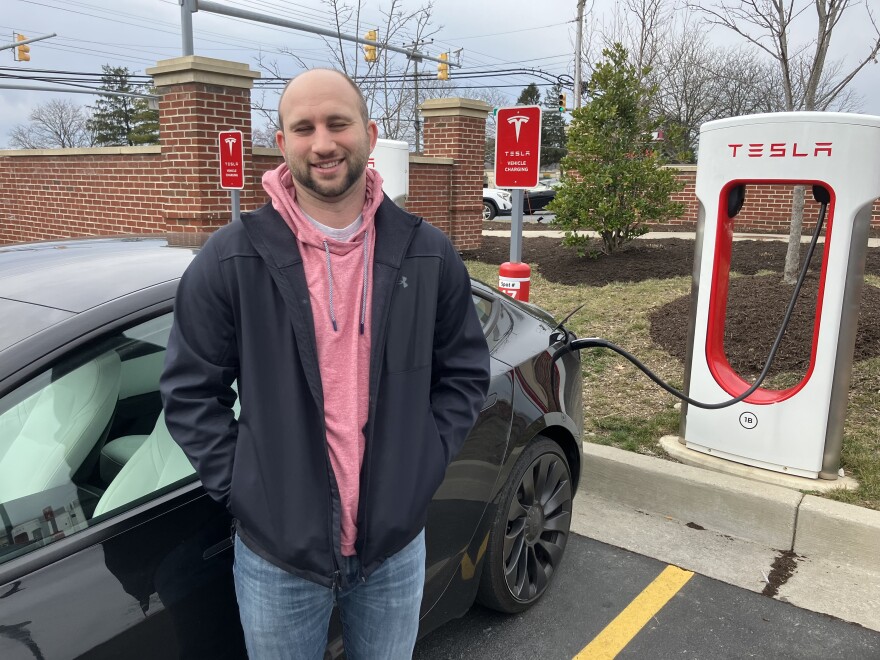Editor’s note: This is part of WYPR’s ongoing coverage of the environment in Maryland known as Climate Change In Your Backyard.
In order for Maryland to meet its goal of reducing greenhouse gasses, a lot more people will need to buy electric cars.
And not just more affluent residents who own their own homes.
Electric cars are becoming more affordable. But Marylanders who live in apartment buildings and townhouses still may not be able to buy them because they can’t charge their car at home.
Del. Jen Terrasa, a Howard County Democrat, is proposing legislation that would require new and substantially renovated townhouse and apartment buildings to have charging spaces.
Terrasa said getting chargers available to all kinds of homes is essential to having the electric car market to take off.
“According to the U.S. Department of Energy, around 80% of vehicle charging occurs at home and accessibility of home charging is currently a major barrier to residents who may want to buy electric vehicles but can’t because they can’t charge up at home,” Terrasa recently told the House Environment and Transportation Committee.
Aaron Matty lives in Westminster and commutes to his job in Towson in his Tesla Model 3. That commute from Carroll County is roughly 30 miles. Matty has a charger at home but forgot to plug it in the night before. So he pulled into a charging station at a Wawa on Joppa Road in Baltimore County.
Day in and day out, Matty said he relies on the home electric car charger.
“I personally feel that if you don’t have one you would run into problems,” Matty said. “I feel like you definitely have to have a charger at home. In fact, when I first bought it, the guy kind of had me convinced that I didn’t need one and I very quickly realized that I did.”
He says finding public charging stations can be an inconvenience. Then you have to hang around while the car is charging up.
Unlike people with homes and their own driveways, those who live in townhouse communities and apartment buildings are at the mercy of the developer or the landlord providing parking spaces with vehicle chargers.
Tom Clark, who is on the executive board of the International Brotherhood of Electrical Workers Union Local 26, told the house committee that the legislation would make electric car charging a possibility for both the haves and the have nots.
“Not everybody has a Tesla and a three-car garage,” Clark said. “I think this helps out the people that really need it.”
But Baltimore City, in written testimony, said it opposes the legislation because it could drive up the cost of affordable housing for residents who likely don’t own vehicles.
“While we understand the goal is to provide sufficient electrical charging to encourage the adoption of EVs, there are potentially unintended consequences here," wrote Nina Themelis, interim director of the mayor’s office of government relations in a statement.
The Maryland Association of Counties opposes it as well, in part because it believes building regulations should be left up to localities.
Robert Enten, a lobbyist for the Maryland Building Industry Association, told the committee it’s important to remember that some people will not have electric cars in the years ahead.
“There are no free lunches out there,” Enten said. “Somebody’s going to pay for this. The cost to the builder, the cost to the developer, is going to be passed on to the buyer.”
Enten said the building industry could support the legislation with changes but did not elaborate.
Getting more people to buy electric cars is key if Maryland is going to make its goal of reducing its greenhouse gasses by 60% by 2031. Transportation by far accounts for the largest source of greenhouse gas in the state.
In December, the state reported there were just over 60,000 electric and hybrid cars registered in Maryland. It has a goal of 300,000 zero-emission vehicles on the road in two years.
Del. Mary Lehman, a Democrat who represents portions of Anne Arundel and Prince George’s County and a co-sponsor of the legislation, pointed out that homes built today will be around for decades “after most motorists are already driving EVs, so it’s not too soon to enact this bill.”
Del. Terrasa, the bill’s sponsor, said it’s cheaper and easier to put the charges in during construction rather than later on down the road.
“I think it’s so important as we’re going forward and we’re really trying to convert all of our vehicles over to electric vehicles eventually that we have the infrastructure in place, that we don’t leave communities in the lurch trying to retrofit,” Terrasa said.
The legislation also would require new single family homes to be electric car charger ready.
If approved, the law will take effect October 1, 2023.









